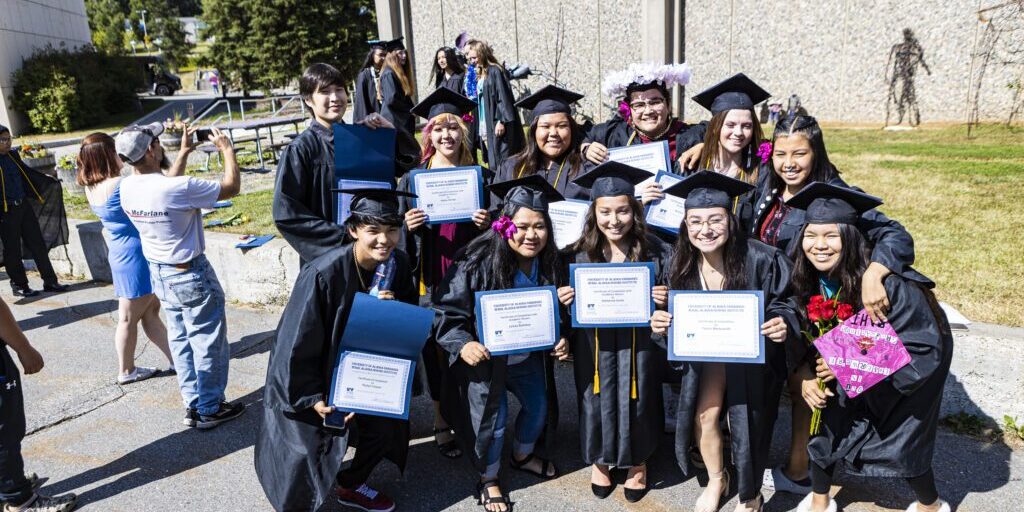Students who attended the 2021 RAHI program in Fairbanks reported a wonderful experience. RAHI, a six-week academic initiative, partners with UAF to help Native and rural Alaskans succeed at college.
The program offered six weeks’ worth of college credits. High school students took classes that fell into three distinct categories: a research track, a teaching track and an exploratory track. Between 8 am to 5 pm, students attend classes, such as Alaska Native language study, chemistry and biochemistry and writing. For physical education, students are given the choice between yoga, karate, and Native dance. After classes, students are expected to work on assignments during a study hall period and then to do chores before heading to bed. The work is challenging. Participants must take 6 credits to be considered full time students during that short period of time. But the kids are up for it. This year’s students took 9 credits on average, Program Manager Brianna Pauling said.

The students’ initiative was matched by the passion they had for their classes. Rowan Hill, an insect enthusiast from Nenana who intends to major in biology once she gets to college, got in depth about the research class that allowed her to study bugs.
“In Entering Research, it was in the first week, we went out and collected bugs and stuff out at I believe Tananana Lake… You had to go out and collect things and bring it in. We brought in our samples and then processed our samples ourselves. It was a lot of hands-on learning and I really loved that,” Hill said.
RAHI business class gave Nome student Bode Leeper, who wants to major in computer engineering, the opportunity to build a business model for whatever kind of business he wanted.
“Mine was an e-sports team. I wanted to start an e-sports team,” Leeper said.
During off hours, students participated in fun excursions, such as white-water rafting or volunteer work. Christian Finau, a RAHI student hoping to do pre-med studies in college, dwelt fondly on a connection she made while cleaning a woman’s house.
“And we had went to help one of the elderly women, she was actually present at our graduation… I really enjoyed helping her. Because while we were cleaning her house and helping her around and watering her plants and everything, she was talking with us. She was actively engaging in conversation with all of us. She was just a bright person, I absolutely loved being with her. And I loved that she was there at graduation. I gave her a big hug when I got my diploma, it was so great,” Finau said.
Much of the RAHI homework was left to the student to do unsupervised. Many students mentioned the sense of independence this responsibility gave them, noting how it felt like a head start for a real college atmosphere. August Cooper from Ketchiken, a student hoping to major in acting, notes how RAHI prepared him for a collegiate environment.
“It helps me kind of get my foot in the door, in the beginning of college, because I feel like a lot of people have trouble integrating from their usual life to college life. College is such a unique and big environment wherever you are going to go. I feel like this helps me adapt and learn,” Cooper said.
Thorough preparation for both the atmosphere and academic side of college enables students to feel more confident in their futures in higher education. Instilling confidence is one of the most important objectives of RAHI, Pauling said.
“Our main goal is just to put them through a program that proves to them that they can do it and that they can succeed. And that’s what a lot of the students will get out of the program. By the end they are all kind of saying that they’ve grown the confidence they needed to see themselves as a successful college student,” Pauling said.
RAHI’s method evidently works. Pauling reports that alumni have often called back to describe the impact RAHI had on their lives.
“It’s not very rare to hear a student, years later down the road, say that RAHI is what inspired them and changed their life,” Pauling said.
Student Bode Leeper recommends RAHI to his peers.
“If you’re considering going to RAHI as a junior or senior you should totally do it. It’s a great experience. You will be so glad that you did it. Once you finish, it feels so good knowing that you were able to take advantage of that free program that will impact you for the rest of your life. So, thank you RAHI,” Leeper said.
Applications for next year’s RAHI program open in January.
Image at top: Group photo with RAHI’s class of 2021. Photo courtesy of KJ McElwee.




